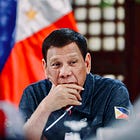Snap election: another dirty trick to remove Marcos from the presidency
This piece is freely available to read. Become a paid subscriber today and help keep Mencari News financially afloat so that we can continue to pay our writers for their insight and expertise.

Whoa, a snap election? It evokes memories of the February 1986 electoral duel between dictator Ferdinand Marcos Sr. and widow Corazon Aquino. This was the first and only time a snap election took place in the country’s history.
Marcos had the power and authority to call for a snap election as he faced a worsening political crisis in the 1980s. Both Marcos and Aquino claimed victory after the polls, marred by widespread irregularities, manipulations, and violence. It precipitated the historic, near-bloodless popular uprising, known as the EDSA People Power revolt, that led to Marcos’ downfall and the rise of an inexperienced woman, the first woman leader of the Philippines.
Marcos had gambled on a snap election to repair his questionable leadership after Senator Benigno Aquino Jr was assassinated at the Manila International Airport minutes after returning from a three-year exile in the United States. Marcos lost in the wager. It was costly. Nearly 14 years earlier, Marcos imposed martial law to hold on to power. He was no longer eligible to seek a third term after winning the 1965 presidential elections and a re-election in 1969.
Truth matters. Quality journalism costs.
Your subscription to Mencari (Australia) directly funds the investigative reporting our democracy needs. For less than a coffee per week, you enable our journalists to uncover stories that powerful interests would rather keep hidden. There is no corporate influence involved. No compromises. Just honest journalism when we need it most.
Under the 1935 Constitution, he was only allowed two consecutive, four-year terms. A year before the 1973 presidential balloting, he declared martial law and revised the Constitution, introducing a unicameral parliamentary system.
He slowly restored normalcy by lifting the martial law in 1981, calling for an election six months later. It was a sham election. He won with more than 88 percent of the votes, defeating a token candidate, Alejo Santos, a retired general. Under the parliamentary system, he had a six-year term, ending in May 1987, but he was forced to call for a snap election a year earlier.
The snap election was meant to give him a fresh mandate and restore people’s faith in his government. It was the same logic that Senator Alan Peter Cayetano pushed when he suggested a snap election. He said the people lost their trust in the government due to the widening corruption scandal in the government’s infrastructure projects. Cayetano was proposing the president, vice president, and the members of both houses of Congress to voluntarily resign and new elections are called to restore public trust in the government. But there was opposition to Cayetano’s proposal.
The 1987 Constitution, which returned the country to a presidential system, does not allow a snap election. In a parliamentary system, a snap election can be called by the head of government after dissolving the legislature. Under a presidential system, Congress cannot be abolished. Congress also sets the election schedule through a legislative process.
The only way for a snap election to happen is when the elected officials agree to resign voluntarily, but that will not happen under this government. No law allows a snap election, and no politician in his right mind will agree to quit and call for new elections. Senator Cayetano’s proposal is dangerous. The Philippines may sink deeper into a sinkhole. There could be uncertainties if a snap election is called. Ferdinand Jr must have learned valuable lessons from his father.
He will not be fooled into losing his presidency. From the time his alliance with the vice president broke up, the Dutertes were trying to weaken his government and eventually take him out. They have called him names and blame him for the problems faced by the government, including the corruption scandal while feigning innocence. But the Dutertes did not succeed. The snap election could be the latest trick the anti-government forces have come up to Marcos to resign.
The opinions expressed are those of the author and do not necessarily represent the views of this publication.
Got a News Tip?
Contact our editor via Proton Mail encrypted, X Direct Message, LinkedIn, or email. You can securely message him on Signal by using his username, Miko Santos.
Sustaining Mencari Requires Your Support
Independent journalism costs money. Help us continue delivering in-depth investigations and unfiltered commentary on the world's real stories. Your financial contribution enables thorough investigative work and thoughtful analysis, all supported by a dedicated community committed to accuracy and transparency.
Subscribe today to unlock our full archive of investigative reporting and fearless analysis. Subscribing to independent media outlets represents more than just information consumption—it embodies a commitment to factual reporting.
Not ready to be paid subscribe, but appreciate the newsletter ? Grab us a beer or snag the exclusive ad spot at the top of next week's newsletter.






